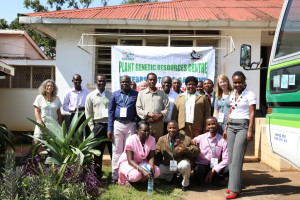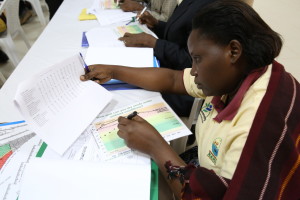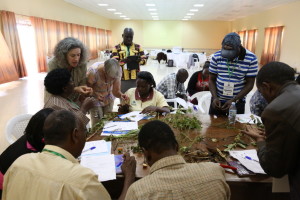Category : News
Published : November 12, 2012 - 12:22 PM
Introduction
The world we live in is ever changing, growing and facing new challenges on a daily basis including threats to the plants that sustain our existence. 20% of all plant species are threatened with extinction, including many wild plants that are closely related to our crops and hold the potential to adapt agriculture to unprecedented changes. Today, a staggering 80% of global plant-based food intake comes from just 12 domesticated plant species. In fact, 50% of all this food energy comes from three species: wheat, rice and maize. That’s a very limited and narrow diet, considering the vast numbers of plant species that are available to provide food to people or diversity to crop breeding programs.

Dr. Kate Gold and Emma Williams of Kew Gardens with members of the training course at the Plant Genetic Resources Centre
With this, the need for plant based research and conservation has never been more pressing. The project Adapting Agriculture to Climate Change: Collecting, Protecting and Preparing Crop Wild Relatives is led by the Global Crop Diversity Trust and the Millennium Seed Bank of the Royal Botanic Gardens Kew, UK, and is supported by the Government of Norway. Together they are working together to combat climate challenges by making available the diversity within wild species that are related to our major food crops. The project aims to collect and protect crop wild relatives (CWR) of the world’s 26 most important crops and to prepare collected material in a form that plant breeders can use to produce varieties adapted for future climatic conditions.
Training in Uganda
Following on from a successful training course in Vietnam, the CWR project ran a training course in Kampala, Uganda from 11-15 August 2014, in collaboration with eight national agricultural research organisations.
This course kicked off the African regional work within the project and is part of a new capacity building effort designed to focus on the collection and conservation of crop wild relatives.
Plant conservation practitioners and botanists from Ethiopia, Ghana, Kenya, Mozambique, Nigeria, South Africa, Sudan and Uganda had the opportunity to work alongside Dr. Kate Gold and members of RGB Kew’s Seed Conservation Department based at the Millennium Seed Bank, as well as representatives of the Crop Trust.
The emphasis was on capacity building and knowledge sharing, which are both extremely important to the longevity of the project. The sharing of knowledge on correctly collecting and storing material now will reap benefits far into the uncertain future as African collections are used by researchers and pre-breeders.
In-field and theory learning
The course was designed for participants to enhance their skill set in collecting, processing and storing ex situ seed collections of crop wild relatives. A mixture of theoretical and practical field-based elements added up to an insightful and enlightening experience.
Technical details behind collecting and long-term conservation were discussed during theory lessons, including how the relationships between temperature, seed moisture and longevity can impact the storage of seeds; how to target areas and species for collection; and how to use collecting guides.
For one participant, the course beefed up skills through the whole collecting process: ensuring seed quality by knowing seed behaviour, using psychometric terms and charts, preparing a seed collection trip through knowing what materials and equipment are needed. Making quality collections so that by the knowledge which I learned I can collect good quality seeds for long-term conservation.
Practical field exercises saw participants assessing potential collections through population, phenology, physical quality and seed quantity in order to choose an appropriate sampling strategy for a particular species. They also made quality field collections of seeds and herbarium vouchers with associated data, and went on to chose appropriate post harvest seed handling methods. Lastly, participants got to grips with the Seed Collecting Guides. The CWR project provides the Guides to all national programs, including data such as identification tips, flowering and fruiting time and suggested methods for collection.
As a result of the course, participants are now able to plan their own seed collecting trips, handle collected seeds appropriately in the field and laboratory and dry and store seeds safely. The experience illustrated the importance of skill sharing in crop wild relative seed collecting and conserving, in Africa and every continent.
Feedback from participants
Participant feedback from the course highlights the importance of training and international partnerships, with the majority of participants strongly agreeing that the course has improved their knowledge, skills and understanding of how to collect, conserve and manage high quality ex situ collections of wild plant seeds in order to make a contribution towards global targets to conserve plant species. I am grateful for the privilege, thanks to the Millennium Seed Bank, Kew and the Global Crop Diversity Trust, said one participant, and it’s good to have continuous strengthening through such training, links and contacts to fully address the project objectives.
The training courses are and always will be an extremely valuable service provided by all involved, as the importance of sharing knowledge, technology and experience is paramount to the research and conservation of seeds.



